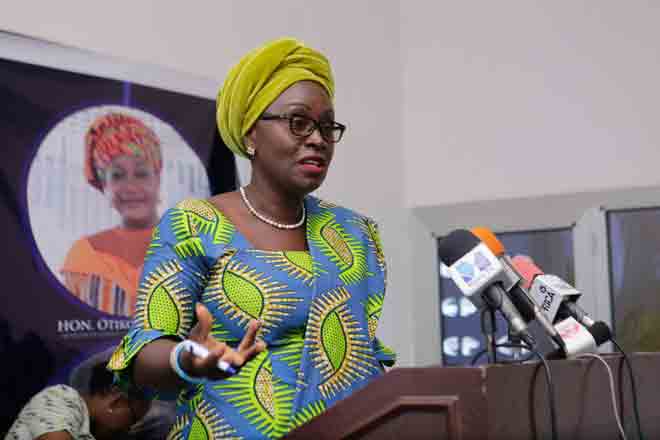
Ghana holds virtual commemoration of Menstrual Hygiene Day
A Deputy Minister of Education, Ms Gifty Twum Ampofo, has stated that unless menstrual health is addressed by all relevant sectors through appropriate policies, programming and funding, gender equality will not be achieved.
She has, therefore, called for policies on the provision of gender friendly and equitable toilet facilities with changing rooms in all schools and government offices, as well as easy access to menstrual hygiene products by the reduction or removal of taxes on them.
Delivering the keynote address on Thursday, May 28, during a virtual seminar to commemorate the 2020 Menstrual Hygiene Day on the theme; ‘It’s Time for Action”, Ms
Twum Ampofo underscored the importance of the day which was marked around the globe to raise awareness of the challenges women and girls faced due to menstruation and to highlight solutions that addressed those challenges.
She noted that the theme for this year’s commemoration highlighted the urgency for the collective work needed to both change the negative social norms surrounding menstruation and catalyze progress towards empowering women and girls to unlock their educational and economic opportunities.
Periods know no pandemic
Ms Twum Ampofo said over 800 million women and girls menstruated every day the world over, yet they faced barriers to properly manage their periods.
She said, “The social stigmas and taboos surrounding menstruation often prevent women and girls from attending work and school. Even when they do attend while menstruating, the lack of access to menstrual hygiene products, lack of sanitation infrastructure such as separate toilets with changing rooms and handwashing facilities and inadequate menstrual hygiene education can prevent women and girls from reaching their full potential in the classroom, in the workplace and at home.”
The raging COVID-19 pandemic, she added, has also indirectly affected menstrual hygiene management (MHM) through various avenues, explaining that it restricted mobility and increased challenges in obtaining certain essential items.
She called for the generation of quality data to establish how MHM could improve girls’ education outcomes, saying we needed impact evaluation research that reliably measured absenteeism in school as well as learning at home.
“Few studies have plausibly identified the role of menstrual hygiene interventions in reducing absenteeism. And where absenteeism is inevitable, as is the case with the current COVID-19 pandemic, interventions for increased MHM awareness that interface poverty, gender and education need to move beyond individual social variables and determinants of good health to develop culturally sensitive responses that factor dynamism, diversities and complexities within communities, including the ability to cope during emergencies.
“Mainstreaming key MHM indicators that monitor adolescent girls' absenteeism in WASH programming would have significant implications in achieving the Sustainable Development Goals (SDGs) regarding health, education, economic empowerment and gender equality. A clarion call is, therefore, made not to allow the current global corona outbreak to erode the vital MHM gains already made in leaving no one behind but leverage these times to learn how to increase intervention effectiveness,” she said.
Menstruation is indispensable
The Deputy Minister for Gender, Children and Social Protection, Ms Freda Prempeh, who chaired the webinar, described the day as very important because menstruation was indispensable to human life and procreation, said the theme for this year’s celebration called on stakeholders to act to support menstrual hygiene management by ensuring that girls had access to information, clean toilets, play and work effectively at any time of the month.
She called for gender-inclusive, integrated approach to sanitation through Menstrual Hygiene Management (MHM) to ensure that the benefits of sanitation and hygiene became truly universal.
